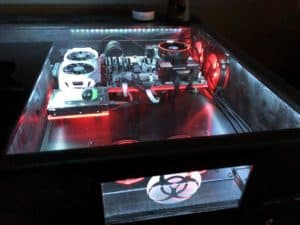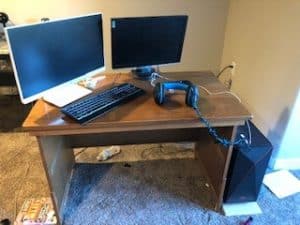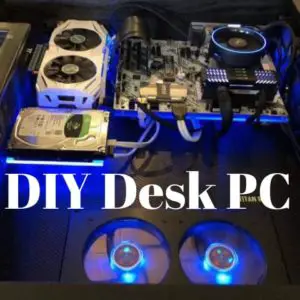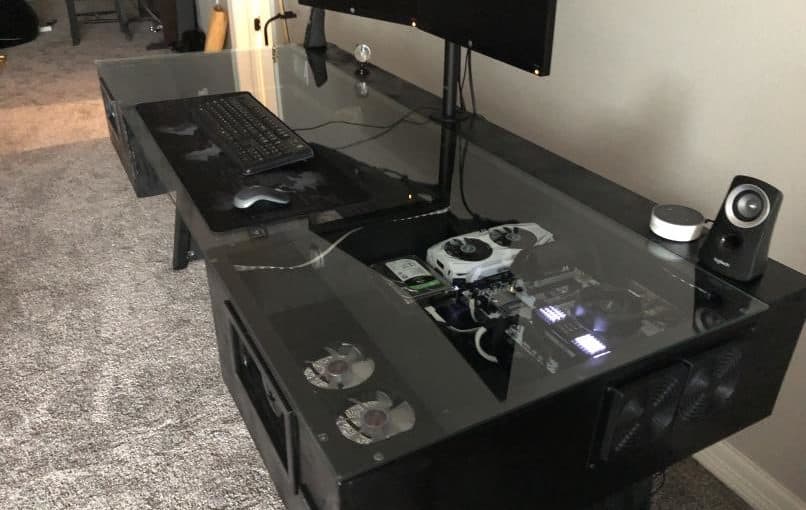If you are on the fence about whether or not you should delve into the journey of building your very own, custom desk PC, rest assured you are not alone. I struggled for months before finally committing. My son was so taken by the glam shots online of computers built into desks with all their LED lights and liquid cooling but I wasn’t sure that I was knowledgeable enough or, let’s face it, capable of even building one. I had no idea how to build a basic desk much less one that incorporated a fully functioning computer system inside it. Looking back, however, it was an incredible experience for my son and I. I made sure that he was vested in the project. He did most of the general cuts and the painting as well as installing the computer parts. Full disclosure, he put together a video editing computer for me when he was 12 so he had a basic understanding of the PC side of the build. We actually repurposed parts of this build for the Desk PC. Here’s a quick video of the video editing build if you interested in seeing a 12-year-old build a computer.
Regardless of your experience with building computers or desks or anything else, I’m here to tell you that you absolutely can do this. Now that we have completed this project, I have no reservations with building another one or encouraging you to build your own.
So while you are sitting there on the fence, consider these six reasons why you absolutely should make the plunge into building your own desk PC case.
1. Desk PCs are Extremely expandable and customizable
When building a computer in a typical PC case, you are limited by the space within the case and the predefined mounting locations for components. The motherboard goes where it goes. Same for the power supply. The cables have to be routed the way the manufacturer has chosen. Everything is predefined and limiting. When you custom design your desk PC case you are in charge. You get to decide where the motherboard will go, where the hard drives will be mounted and how the cable management will be handled. Yes, those are decisions that you have to deal with but they are fun decisions. They are exciting because you get to design the layout yourself. A PC case forces you into conformity but a custom desk PC liberates your creative thinking and allows you to build a system that is right for you.
One of the frustrations I ran into in my previous video editing build was a lack of flexibility in adding additional hard drives. It was possible to cram them under the power supply shroud with all of the cables but that just didn’t feel elegant. Our desk PC has more than enough space for me to not only install additional hard drives over time but to display them. Which brings us to reason number 2.
2. A Desk PC is a showcase for your computer

If you are reading this then you are likely not the type of person who just drops by Best Buy and picks up a stock desktop system with predefined specs. You are wanting something unique, something that screams “wow”! There is no PC case on the market that will offer a wow factor equal to a custom built Desk PC case. Your friends will stare in awe when they see it. You have likely spent countless hours studying reviews and benchmarks on particular computer components. Why shove all those fancy parts into a PC case and slide it under your desk when they can be on display right on your desk, actually lit up inside your desk!
3. A Desk PC can reduce dust on your computer parts
Traditional PC cases are severely prone to dust buildup, in part because of the inherent design flaws of the cases. There are almost always numerous air gaps where metal corners meet and unused expansion slots allow dust to be introduced to the system. Forcing the system into a positive pressure airflow helps to reduce this but any desktop PC owner will tell you that dust buildup is almost always an issue. A desk PC, by comparison, can be built with minimal air gaps to allow for a more controlled introduction and movement of filtered air. I’m currently working on a prototype for demonstrating the benefits of an airtight controlled airflow system and how to incorporate that theory into a desk PC design and will be posting my findings soon. In the meantime, just know that you have more control over airflow and the prevention of introducing dust into your system with a desk PC than you will ever have with traditional desktop PC cases.
4. A Desk PC can keep your computer parts cooler
Anyone who has experience with desktop computers will tell you that the general rule of thumb is this – the smaller and tighter the space, the more problems you can have with heat. Small desktop form factors are great for space saving purposes but once you put a load on the system playing games or rending video that small contained space can turn into the computer equivalent of a microwave oven, cooking your expensive computer components to well done.
Airflow is critical to be sure but one huge benefit to a desk PC is that it allows for a much larger area of space for heat to move away from the components. The reason for this is ambient temperature meaning the temperature within the case. Think of it this way. Small spaces heat up faster than large spaces. You can heat a small room with a portable heater much easier than you can heat an entire house. The larger the space, the easier it is for warm air to move away from the computer components. Add into that an effective airflow system and you have a winning combination for ensuring the longevity of your investment.
5. A Desk PC makes the best use of space

This was my son’s original “gaming setup” if you could call it that. It was small, cramped, and barely had room for his peripherals. Ideally, the desktop PC should be off the floor to minimize dust collection but because the space was so limited it had to be placed on the floor. Since we have carpet in the room I had it sitting on a piece of plywood to keep from smothering the system or having a fire hazard.
By building the computer system into the desk, we eliminated the issue of the desktop sitting next to the desk or on top of it. We also added a dual display monitor mount to get the monitors off the desk adding more surface space. We also made it much wider which further added to his workspace.
Another benefit along these lines is cable management. We built a pocket into the back of the system that allows for all of the monitor cables and power cords to be hidden out of sight. We previously had a cable strip laying next to his computer with everything plugged into it – the computer, the monitors, etc. When we built the desk PC, we actually made it so that the power strip is hidden in the pocket in the back so as to completely hide and manage all of these cables. The cable management space is about five inches high and runs the entire 73-inch width of the desk. The motherboard and graphics card IO ports terminate back there so all of those cables are managed as well. It’s a great use of space and ensures a clean look.
6. Satisfaction of a DIY Build
The final reason that you should consider building your own desk PC is one of personal satisfaction and accomplishment. My son beams with pride when people come over and see his desk PC. They ask if his dad built it and he says “we built it together”. He often walks into the room and turns it on and just looks at it. Really, it’s that impressive to see. We aren’t woodworking experts and it’s not 100% perfect by any stretch of the definition but its unique and we built it ourselves.
There is nothing more gratifying than imagining, designing, and actually building something yourself. You can buy pre-built desk PC cases but they are crazy expensive and you are still faced with conforming to what the manufacturer thinks you need and how they think you should build your system. By designing and building your own, you open up a new level of possibility both in what you can have and in what you can do. A stock build, whether it’s in a traditional case or a manufactured desk, will never give you the satisfaction and distinctiveness that a custom build can offer. And regardless of your level of woodworking knowledge, I am here to tell you that you can absolutely do this. If a dad and his 13-year-old son can do it, you can too.
So what are you waiting for? Get started designing your new custom Desk PC today!

